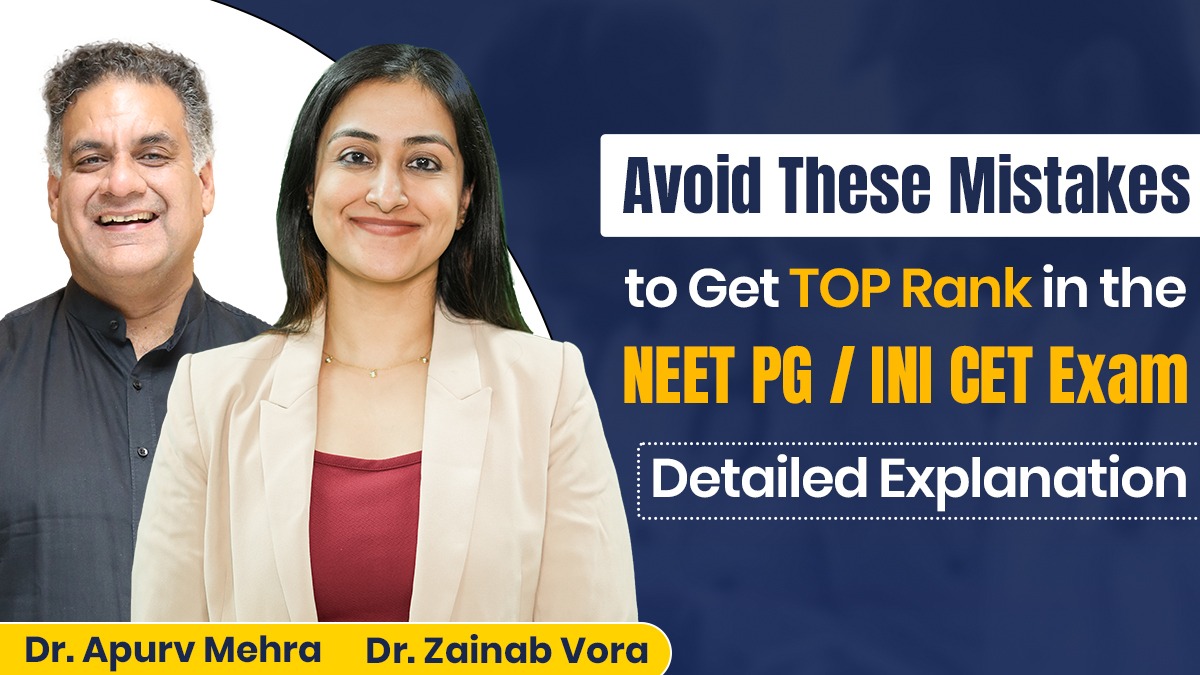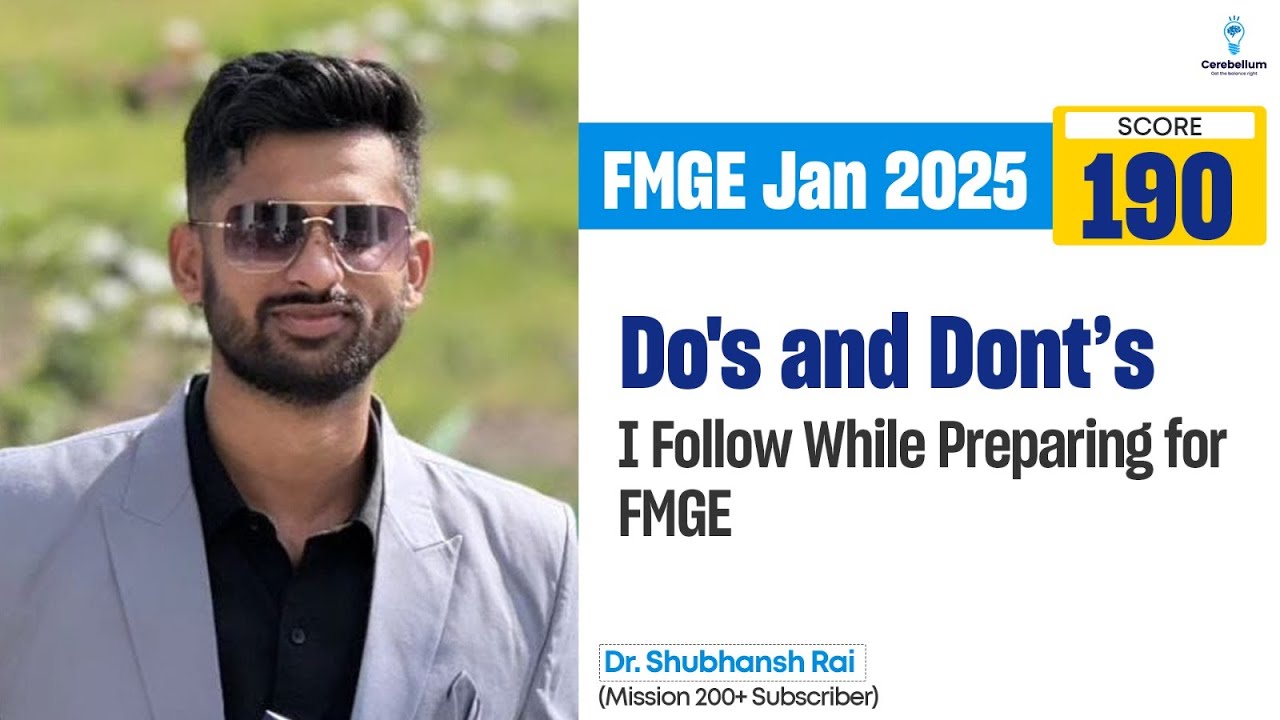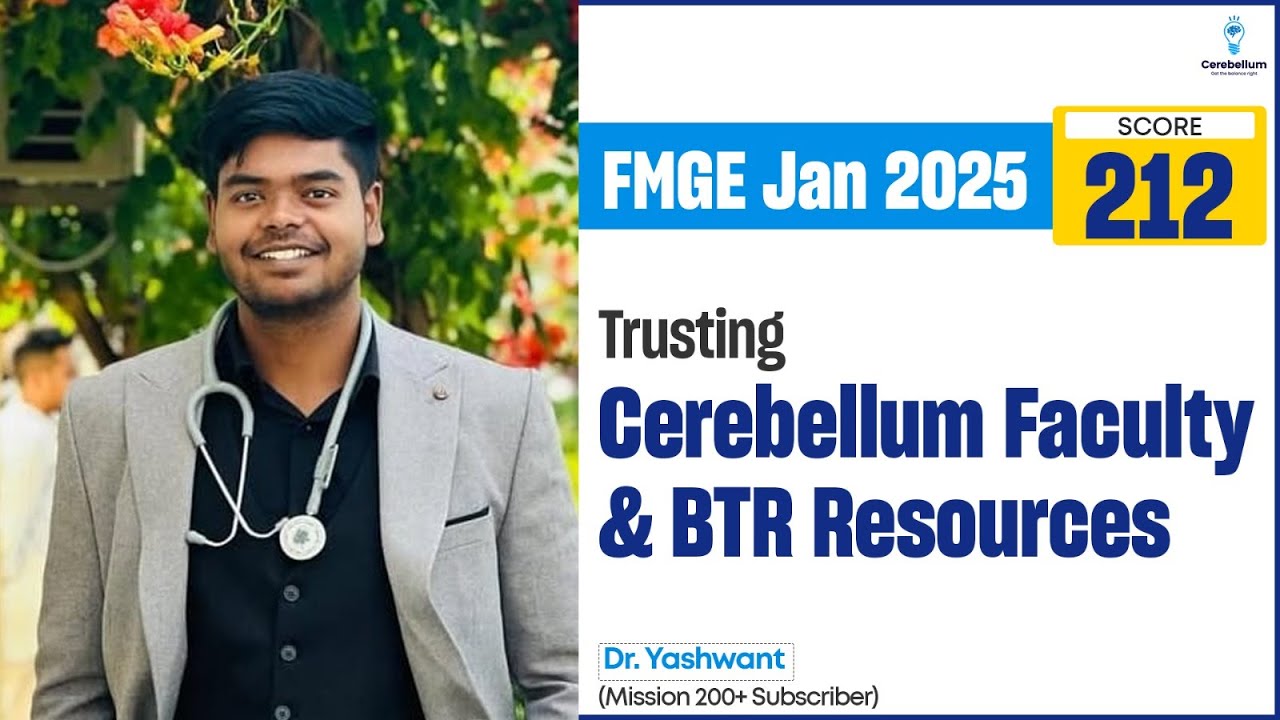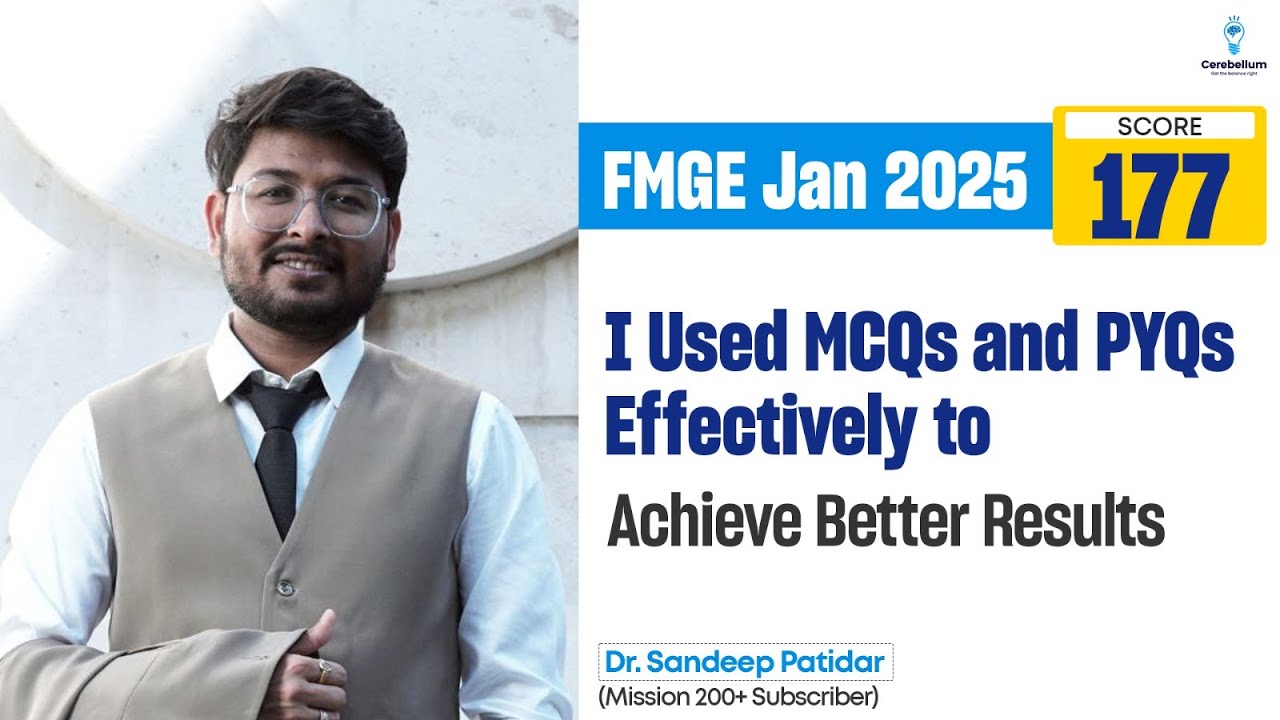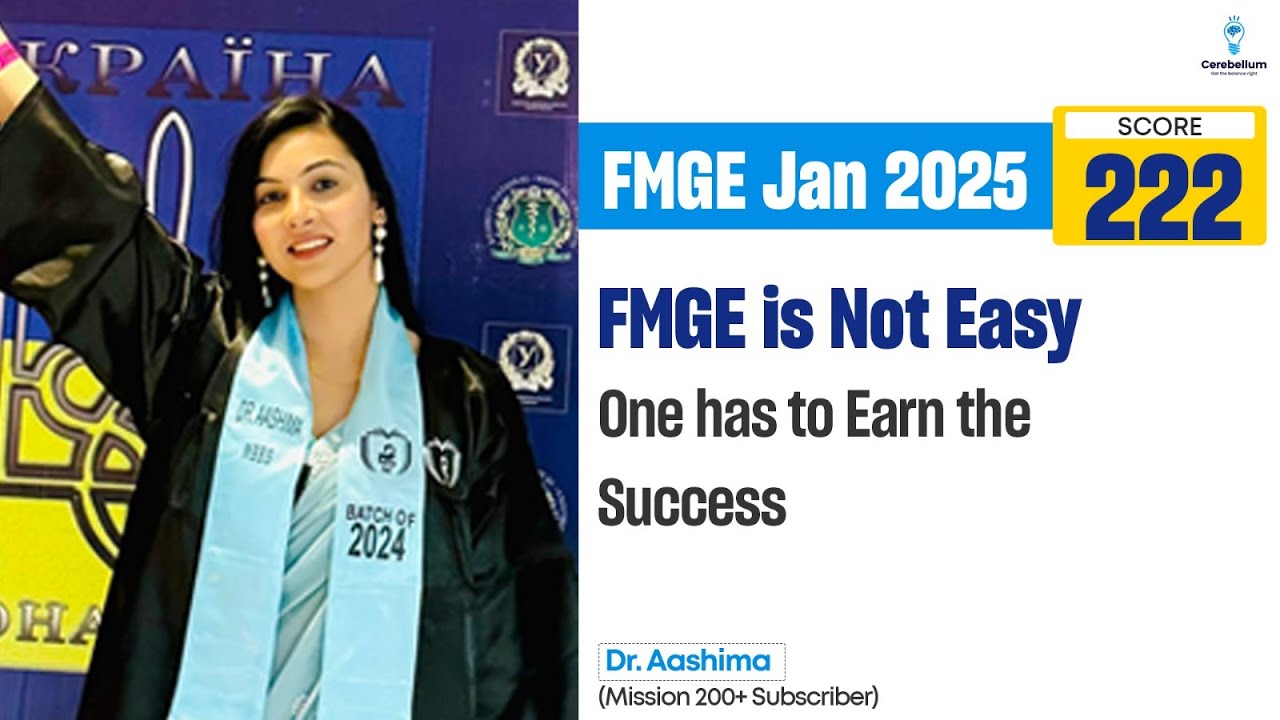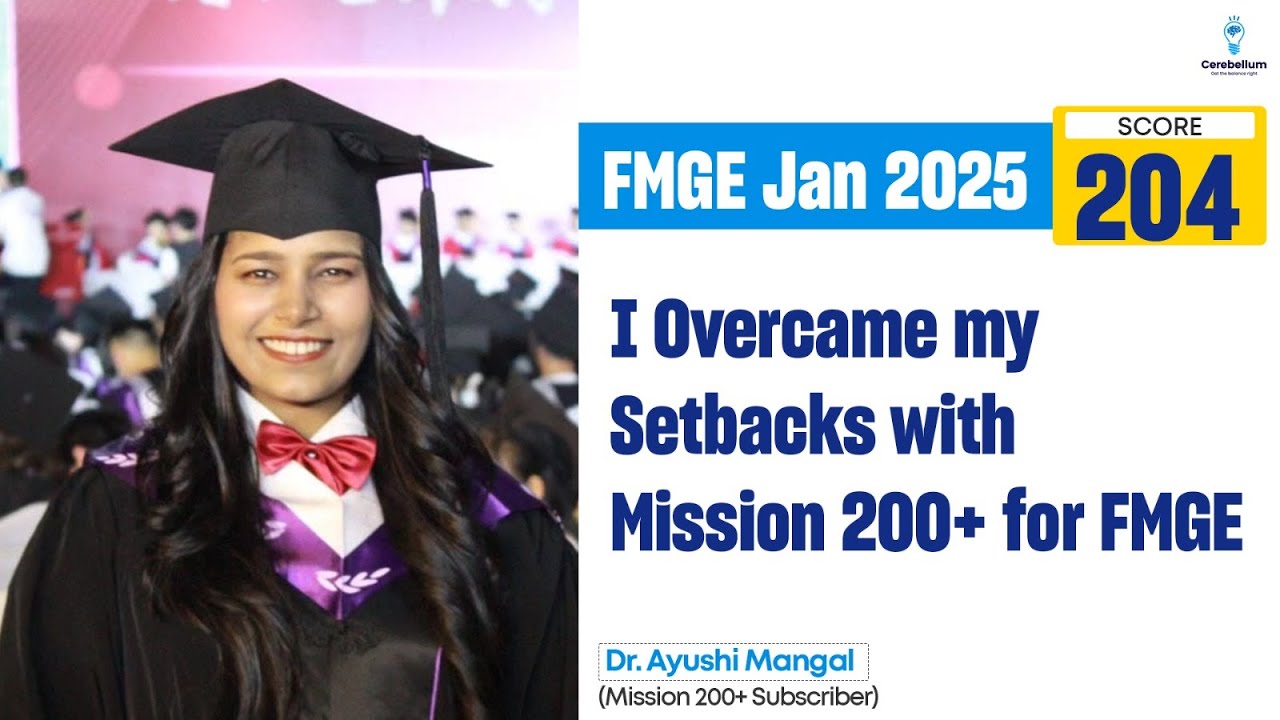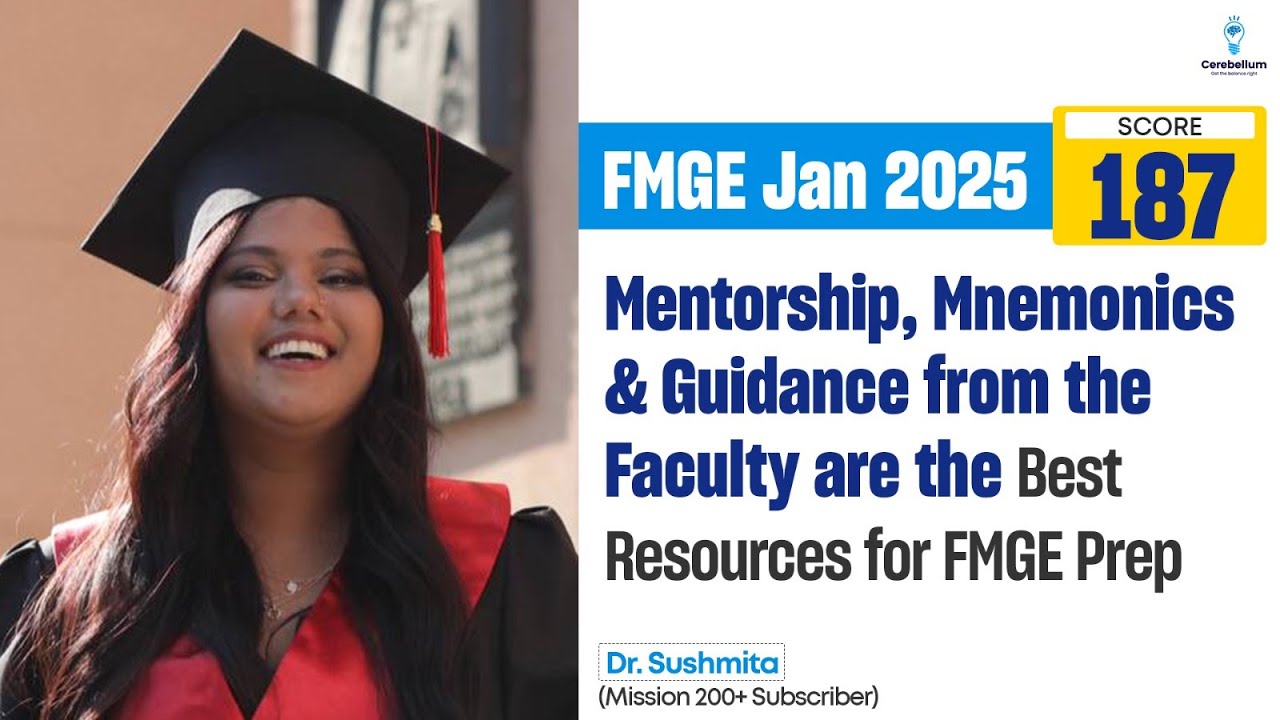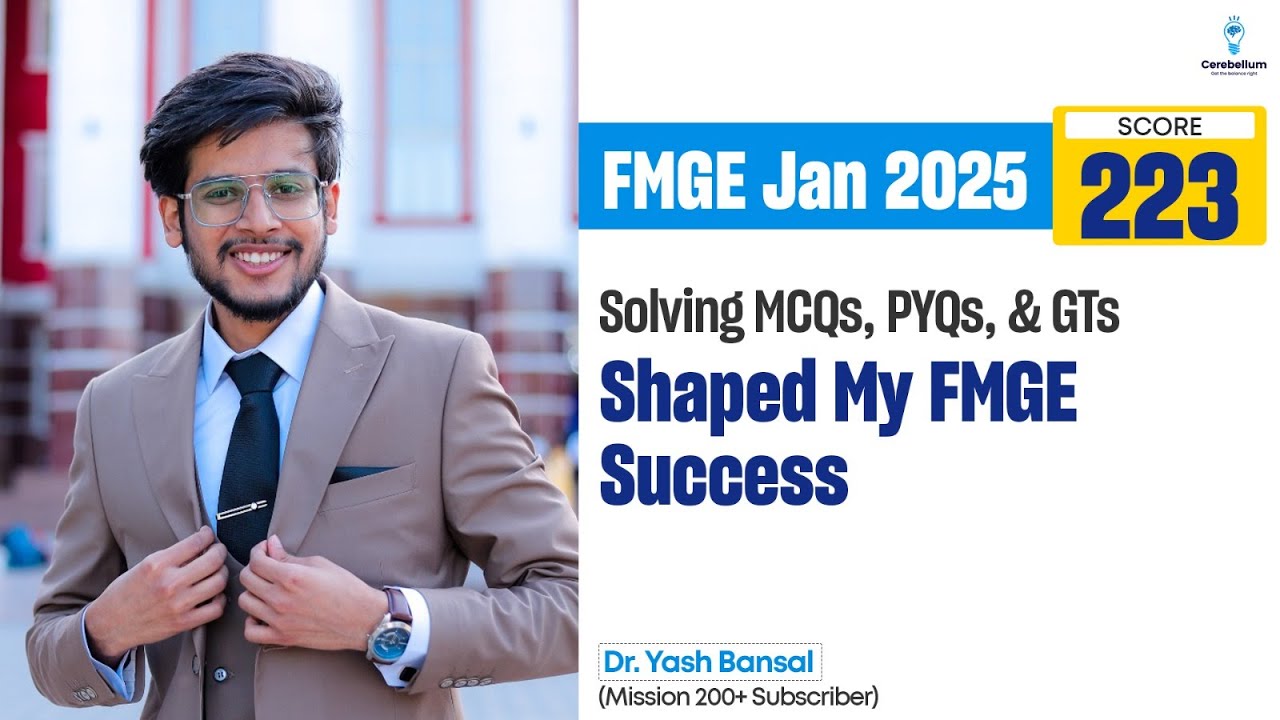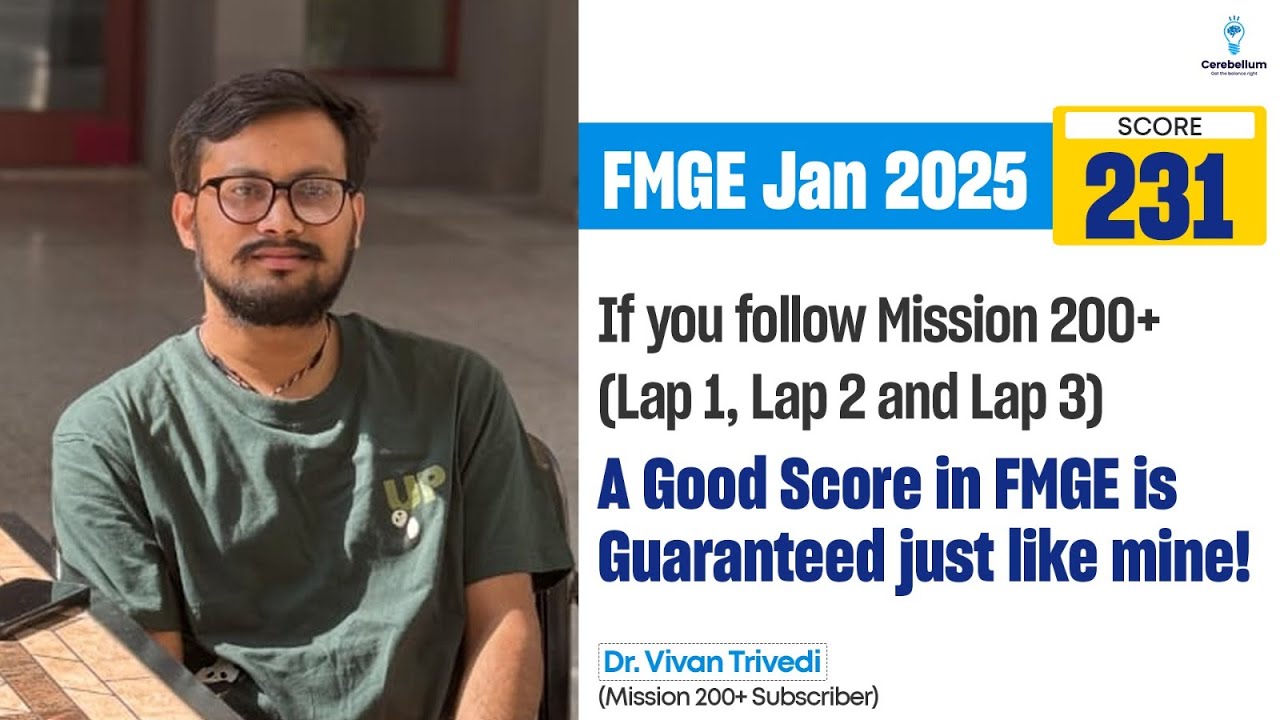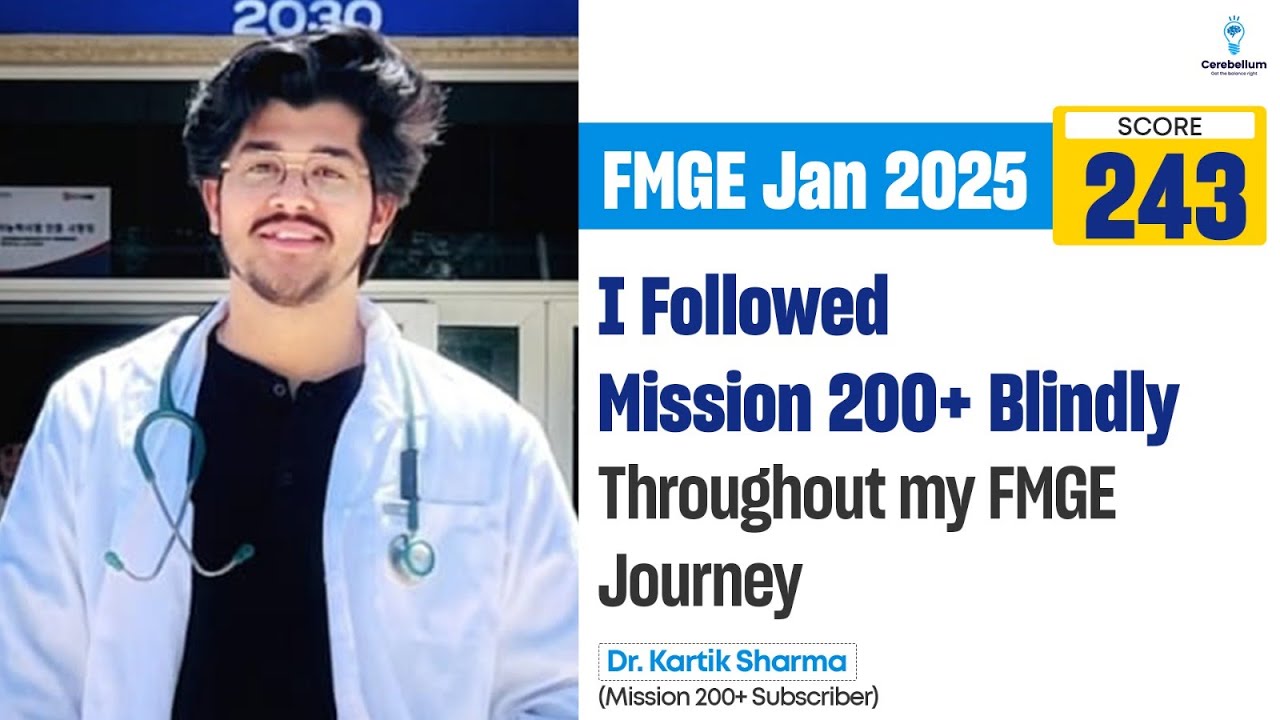You know, she has interviewed a lot of students who did fantastic attending BTR and Cerebellum lectures and she has examples to say this is what they did. But I think there is a major chunk who did some things which they were not supposed to. So if I have to enlist a few of the things I know, which is the first one you say what not to do? Yeah, the very first thing I think is in the mental space more than the academic space which is not to have constant self-doubt.
Yes, there are going to be days when you feel that what I am doing is not adequate, maybe I am not adequate, but it has to be something that you control and you suppress consciously because it is going to come in.
It is something which comes to the best of us, even the topper will have days which are not very good, which are not productive, which are not efficient. In those days, you know, you need people around you and you need yourself most importantly to you know, back yourself more than anybody else this is something that I am going to do and I need to focus on today.
I need to pass through the day, set out and do the things which I have, you know, planned for my day and not focus on emotions too much. So the most important thing is not to have self-doubt and not doubt the content again. A lot of us, you know, have so much FOMO nowadays, there are so many resources out there that constantly, you know, my friend is doing this.
Let me just switch my, you know, a batchmate is doing this. Maybe he’ll get a better rank. So, you know, just stop self-doubting.
Everything is out there. Let me just say to you is all almost the same. Everything is good.
So just focus on what you have and master that. So stop chasing content and, you know, focus on mastering what you have. That will be the second, you know, the thing that they should not do is to chase a lot of content because, after a point, it all becomes something, you know, every resource that you do is going to merge and you have what it needs, you know, so stop chasing content and end of the day, it’s an MCQ exam, right? So what you have to realize is that theory will take you to a certain point.
All of the toppers which I’ve interviewed, you know, said one thing in common we used to do around 50 to 100 MCQs daily. So end of the day, you have to realize it’s not a theory exam. Stop bulking up your notes, you know, stop chasing theory content and focus more on MCQs now.
All right. So, you know, if I can tell you what exactly, you know, needs to be done is in a day, schedule your time such that you’re spending around 40 to 50% of your time on theory, mastering the theory and 50% of the time goes into, you know, doing MCQs. Now when I talk about MCQs, when I talk about MCQs, there are two things.
First, we have previous questions, right? We have PYQs and second are your testing modules, which is your QBank. So previous your questions are not your testing tool, they are your learning tool. Supplement PYQs, when you solve PYQs, they are supplementing to the theory that you know you are reading.
When you’re doing QBank, when you’re doing the subject-wise tests, when you’re doing the E&Ds that we have on the cerebellum, BTR E&Ds, those are your testing tools that okay, I have learned my PYQs, I’ve learned the theory. Now how can I apply that theory to solve these questions? A lot of it might not be covered in the theory. So it doesn’t mean that you change, you know, you switch your resource, it basically means that you need to supplement it with whatever you have learned from the QBank, right? So that is how it goes hand in hand, the MCQs and the theory and then you consolidate it and you know, in the end, you will end up with enough theory and the skill to solve MCQs, which is what is required.
She telling that there are so many options today. The good thing is that with so many options coming up, all the teachers and all the platforms are so much abreast now that they will rarely get things wrong, you know, as what was a decade back. So obviously the quality is improving, but even then have an open mind to verify the content.
It doesn’t mean go and change the source, go and change that point if required. The second thing which I believe is more important is to create a balance between theory and practicals. So it’s not just about PYQs, because PYQs will tell you what has been taught by the teachers is mainly based on whatever has been asked.
All right. As they say, whatever has been asked, will come. Right.
When we understand this, we will get our number. But it can’t just stay at this, you know. So there also has to be testing and then if you find something extra, you supplement in the notes.
Yeah. All right. So and she also very carefully said that about people surrounding you.
Now, that is, I think, the third point that you should be surrounded by the right kind of people. So what is your point or takeaway message on this point? What are your surroundings at this time? So basically, you need to have people, one, who give you a reality check, you know, when we are preparing for PG, this phase is so overwhelming. It’s a short phase when you look at the whole scheme.
But every day seems very, very long, you know. So at this point, there must be people around you who tell you that it’s an exam. End of the day, it’s an exam that you’re attempting.
It is not the end of the world. So I’m just telling you, yes, every exam is important, something which does have a lot at stake. But you are going to have a next chance.
Right. So it is something that you need to keep in mind every day when you’re getting overwhelmed. You have to tell yourself that, OK, I’m preparing for this day, but it is not do or die.
You have to have people who tell you that it’s an exam and you have a lot of other things in life which are going to count so much more, you know, in the whole grand scheme. So that is important. Right.
So do not overstress yourself. The best part of an entrance exam is also its worst part. You know, the best part of an entrance exam is that you have one more chance to go.
And the worst part is the same thing, that you can be complicit in the same point. If it doesn’t happen this time, then. So I will take it the other way around.
Do not give that leniency to you that you start assuming that it doesn’t matter. That is not what she means to say. She is very clear.
Do not burn yourself out. Don’t overstress yourself. Take it easy.
But at the same time, yes, it is just an exam. And I think as a doctor, while treating patients, while writing exams, while reading entrance exam, you will have this feature multiple times that you’ll understand, yes, you have to rise up and show again. But yes, it definitely means that you give your 100% when you’re preparing for any exam.
This is what is very, very important. What is the next thing that you realize that people don’t do as compared to people who qualify? Yeah.
Now I want to talk about revision. So you know, when we talk about revision, everybody keeps saying that it is very, very important, you know, and a common misconception that people, you know, do wrong is, let me finish one reading of all subjects, then I start my second reading, then I start my third reading. So that is not something that you have to do, you know, it doesn’t have to be one cycle getting over.
And then you start with the second cycle, then the third cycle, yes, cumulatively, you need to have done every subject at least thrice, that is the amount of time and information that needs to be reinforced for you to remember at least the factual aspect, right, that number is valid. But what you have to realize is, that you don’t have to complete 19 subjects and start all over again, you will have forgotten everything about the first subject by the time you start the second cycle. So that is not how it has to be done.
It has to be cumulative, it has to be simultaneous, and that is very, very important. What do I mean by this? So let’s say today I’m reading Micro, right, I have completed Micro in five days, and now I’m starting with biochemistry. So now when I’m doing biochemistry, I have to take a micro hand in hand with me, you know, so when I’m doing my biochemistry custom module, what I do is I’ll add micro questions as well, you know so that both of these subjects go hand in hand such that at the end of 19 subjects, now I’m taking 19 subjects with me, that is what you have to do.
So this is as far as the MCQs go, as far as the theory goes, I use the term choti copy a lot. So make a choti copy, you know, a choti copy can be a big copy also. Choti copy represents a very concise source that you have, wherein you’re writing the most volatile parts, which you know, that I’m going to forget, it has to be personalized, you can’t just take my choti copy and you know, you be assured I will get a rank.
No, make a copy, make a book of things that you feel are very volatile and add it and revisit it every day. It has to be something which is just non-negotiable. Before you go to sleep, when your efficiency is falling, you know, you are just done for the day.
Now take this book and scroll through it. What will happen is at the end of it for three months you are with this book, what will happen is you have a solid visual memory, you know, even if you’ve forgotten the number, when you look at that option, it will come to you that it is, I have seen it so many times, this is it, even if I don’t remember, if somebody will ask you, you may not remember, but when you look at it as an option, you’ll remember. So this is that solid concise book that you have to make, in which way, you know, you’re constant, you will constantly be in touch with the 19 subjects while you’re going through your, you know, cycles.
So this is what is one mistake that people make, on the first day will complete 19 subjects, and after that, they will do the revision. That is not how it’s to be done. It has to be simultaneous.
Keep doing previous year’s questions, and keep doing MCQs of subjects you’ve covered. And secondly, keep reading your choti copy such that you always feel that, you know, I’m having everything coming together by the end. That is something which is very important.
So there are two things which I understand here is number one, your revisions will overlap between different subjects. While you’re reading one, you might be dividing another thing of another subject. That’s what I have shown here.
They go hand in glove. So like biochem and micro, so there might be an overlap. You’re reading and the revision of the first might go together.
At one cross-section, there’ll be three things coming on from three different subjects compiling together to give you one question that’s called integration. That’s what I believe. And the choti copy what she keeps on speaking, right, which actually is a very, very famous term, a household term in every medical house now is actually describing your journey of preparation.
It telling it tells you how you started and how you kept on consisting. I was seeing one of your videos and where a student mentioned that I had a bigger copy than I did a revision and she actually had visually shown that and I went to the next one and then I went to the smaller one. So as you as you go down in life, you realize that the things of significance are very few.
And so is the beautiful journey of entering the exam that the same things of significance, right, they become less. And that is what is volatile also what he said. My volatile will be something else and your volatile will be something else.
That’s why copying somebody else’s copy is not going to benefit you, it’s going to harm you. So you have to travel on your own, right? You will not get the seat that you want, you will get the seat that you are worthy of. And how well you play this revision role is very important.
That’s the area where actually people do not do good. It’s like it’s like you win nine matches and then comes the final. All right.
And in that final, you know, you have to be if you look at if you look at what Australia did, Australia lost two matches in the beginning. The first one was against India and the second one was against South Africa. So they lost two first matches, right? They went on to the semis.
They defeated South Africa. At this time, they were peaking and they defeated India. So I was reading that which was the best team.
We don’t know which was the best team. But I just know that the World Cup is not in India. I know the result is like this.
And what depends on, you know, you do not have to be any big player, the biggest player of the world. On that particular day, you need to be very clear that you have revised well and you have gone and played the inning that Travis had played. He might not be the most experienced, not the number one player in the world.
But on that particular day, when it mattered the most, he was the number one player in the field. Chanceless inning. That’s what you call if you have seen that day, you know, it doesn’t mean it’s so easy for me, right? Being a fan of cricket.
But this is what I want to tell you. May all of you be Travis head on that day of end of exam. Right.
But remember, it’s the big occasion which matters. What’s the next advice that they should not, they should be remembering not to falter on? So we’ve discussed, you know, what to do, what should be the timing. Now I want to go into the very nitty gritties and, you know, talk about how any reading should be done.
You know, so we have a passive reading that a lot of us do, you know, we keep reading the notes again and again. When I was talking about the cycles, we say pehli baar padh liya, second baar padh liya. We keep reading.
Yeah, I know so many students who tell me that ma’am I have studied five times. But still, you know, when I look at a question, I get confused about this one or that one. If somebody gives me the book right now, I will open that very page and I know exactly where it is written.
I just can’t remember what it was, whether it was option B or option C, you know. So this is where a very important thing comes in, which is active recall, you know, it is believe me the game changer. If you do this, you know, you will remember your notes much better.
And this is where most of the students go wrong is we keep reading the notes. And after a point, it becomes like a very passive reading where you’re just flipping through the pages. You already know what is written, and where it is written, but it’s not going in your mind.
So this is where active recall comes in. So what I do with BTR is I give them the soft copy, which is not annotated, right? So you take any non-annotated, let’s say these are your notes, non-annotated open firts. Now with your mind, try and fill it, you know, what will come here, what will come here, what is the answer to this? So this is where now you are actually predicting MCQs, right? That if this comes as the question, this is the answer and you’re doing it without options.
You’re doing it, you know, very sharply that now your memory is not going to fail you. So at this point, I’m trying to recall, let’s say I could recall 50% of it, 50% of the boxes I couldn’t fill. I don’t know what is the answer to that.
Fine. Now when I look at the video, you know, now when I look at the teacher saying it out or now when I look at the notes, I am going to remember those missing points so much better, you know because as humans, we are trained that we learn from our mistakes. And if you go back to any, you know, previous test, let’s say you appeared for INI CET November.
If I pick out any MCQ from that exam that you had appeared for and I give you, you will never forget, especially the ones that you’ve gotten wrong, you know? So this is where you’re actually making mistakes right now, rather than waiting for neat PG to make that exam and then remember that answer. So active recall, you are doing the recall on your own. Now, when you see that person saying the answer, you’re going to remember it much better.
Next time I do this, my ability to recall is going to go from 50% to 80%, then it might go to 95%. It may never reach 100% and that’s completely okay, but you will remember so much more better and your visual memory improves with this. So this is what you have to do, you have to build a solid base that you’ve come back to again and again, such that when you have that question coming in the exam, you should know exactly which box, which line that word was written in and when you look at it as an option, you are going to have that confidence and believe me in the exam, this confidence matters.
When you see that question, that option in the exam, you mark it, and when you go to your next MCQ, believe me, it makes a difference. It makes a difference in how you answer the next question as well. Because your confidence in your mind, in your brain, in your ability increases and this is what matters, you know, 200 MCQs are not going to be questions that you have read nowhere, you know, no matter what you’ve done, it’s not going to be from what you have read.
It’s something that you at the moment, look at the four options and figure out, okay, this seems to be the best answer and for that, the ability to back yourself really matters, you know. So that is something that you will have as confidence in when you get these bank questions correct. This is what I call as bank questions, questions which, you know, will come from the theory that you have read.
So you need to get them correct, that is the, you know, aim and that will come with active recall. So I think this is the most important thing that a lot of students don’t do. And then in the exam, they end up getting confused between two options.
So I get three things right here. The first thing I understand here is that active recall is a step beyond it. One is what you write there, right? Second if by chance you have a friend who’s preparing with you, you can discuss with a friend that this is what I have written with my thought process.
Does your friend add to it? Third, listen to the video, complete it and then try to again revise it with your friend because why Zainab has been one of the best students of medical science and a good teacher is because she always keeps on speaking it to people around you. Didn’t you do that? We did the same thing when we were preparing because this is a tough phase, but, you know, people just isolate and distance themselves from everybody. That’s not the way to prepare.
Preparation is distant yourself from distractions, not from the real guys who are preparing with you. So if you fortunately have the right kind of person around you with whom you can ask the question or teach that topic to that person, it’s, it’s a godsend gift. Utilize it well.
That also is a part of active recall. Otherwise, yes, the teacher that they are, the live sessions of the cerebellum are there where we are discussing it with the mission programs and E&D. That’s another option for you to talk to the teacher, but talk, discuss out. Also, find out why it was difficult for you to not find a good point.
If in active recall, you did not remember a figure, it’s okay. But if there was a missing concept, then it’s not okay. Then you need to go in-depth analysis.
The second thing is when you start thinking, which a workbook allows you, not a filled-up book, right? You start oiling your machine, your brain churns out, and then, then it becomes warm and it’s like a machine running on. And that’s how you will have the way to answer one question transferred to the efficiency to the second and so on. And then the third, which you just said at the end, you know, you will be able to select out the options or reject out the wrong options.
And with each rejection, the probability of getting the questions correct. So if this active recall, which she’s talking about, becomes your ingredient of preparation, then it also gets you right on the toes. And you try to figure out what you need to know about that topic.
And your errors, obviously the points that you didn’t write, or your friend told you for that reason. If you don’t know, and your friend knows, that hits you more. Right? So if the person next to you knows it, then it comes to your mind, how does he know it, I should know it carefully.
But either way, whether it’s the video teaching you, the teacher teaching you, or the next person teaching you, everybody teaches you. You won’t get that wrong. This is what she means to say.
Right? The next thing that one should not do, you know. Let’s talk about grand tests now. So a lot of students are scared of giving grand tests.
So there are two extremes. One extreme, who is very scared, doesn’t give grand tests enough. The second one, give too many grant tests.
So we have to maintain this balance that one, you are not testing yourself too much. You know, a lot of people closer to the exam tend to give GTs on a day-to-day basis, on a daily basis. That is something which is not very ideal because this is where you are simulating the actual exam, you know.
So you want to supplement your content, yes, with grant tests by testing yourself on how you know that day is going to pan out, the actual exam day. But you don’t want to give it too much also, you know. So grant tests, I think the ideal frequency would be close to once in 10 days to once in 15 days, you know.
This is something where you are actually doing a sort of exposure and response prevention in psychiatric terms, you know. So what happens, a lot of us are scared of the actual exam. Or we are scared of how, you know, time is going to play with us, how to manage time.
So when you give a grand test, now you are in that mode, you have to transport yourself into the zone that, okay, this is my actual exam, how am I going to do it? What happens is, we give GTs very casually, you know, we give it with nothing to lose because we have actually nothing to lose, but when the actual exam day comes, there is just so much pressure on us that we are not able to perform. So what you have to do with the GTs is you have to tell your mind that if this is the actual exam, how am I going to plan my time, how am I going to approach every single MCQ. So this is very important that when you give the grant test, give it with the feeling of an actual exam, and solve every MCQ, whether you know it or not, how will I do this on the actual exam day, if this very question comes, you know, a lot of times we keep judging.
What if this question, the same test comes on the actual exam day, how will I still find out the answer? As sir was saying, how will I eliminate the wrong options and, you know, guess the best answer? How do I take the most intelligent guess from whatever I know, you know, something that we see in Slumdog Millionaire, he uses every life experience to find out the best answer. Do that on the actual exam day. If you don’t know, use every inch, every ounce of knowledge that you have like it can’t be.
This can’t be the answer. Okay, I am left with two. Which one is better? This is what you have to do.
Do not expect every will be from notes. No, it won’t. I can tell you right now.
What you have to do is you have to now learn how to use every single piece of knowledge that you have to eliminate options and find the best answer. The one who will take the best guess will get the best rank. That is what, you know, is very, very important.
So GTs will allow you to practice this, will allow you to master this skill and it’s a skill. It might sound very juvenile when I say who will make the guess and will get the rank, but no. It is a skill that you have to master, which is the skill to take intelligent guesses, which is the skill to solve an exam.
That is something which gets you the rank. So this is what you have to learn in every grand test. For this, yes, giving it at the right frequency is very important and then analyzing the GTs is very important.
So when you sit for the analysis, another mistake students make is they will take up twenty questions daily and they’ll analyze it over the week. I don’t think that is something which is very ideal because by the time you go on the sixth day, you don’t care why I mark this and you know what the answer is. You don’t care enough.
So what you do is sit down with that GT on the very same day, immediately after you finish the test, first analyze the wrongs. Why did I get this wrong? Was it because of a lack of content? Was there an interpretation error or it was just a problem with recall, you know? So divide your mistakes into recall versus interpretation in the GTs and whatever are your interpretation mistakes, you absorb it then and there.
It is what you learn actively every 10 to 15 years. OK, this is where I should have read it this way. This was the buzzword.
I should have focused on that. So that is what you learn from the interpretation errors. Wherever there is a content error, you know, you supplement it if it was lacking or if it was something which you couldn’t recall.
That is, again, something you have to introspect about why was I not doing active recall? Why did this go wrong when it was there in my notes? That is something that is the hard thing because no one likes to see their own mistakes, right? So this is what students ignore. Even if you give the GT, they’ll keep saying, ma’am, the score is not improving. But you have to analyze why the score is not improving and only you can do it for you.
Nobody else can do it for you. So sit down with your wrongs, again, from the right also, then you rapidly go through the rights. You know, don’t read every solution.
Whatever you knew, you could answer correctly. Just take the win and move on. You know, so this is how you can finish reviewing the GT on the same day.
You know, that is ideal because you will know what mistakes you made, what were the guesses which turned out to be right and why, you know. So, what you have to now do is to give GT a balance to review it and to analyze it very well. In this movie, Gran Turismo, the head of Nissan marketing went and said that, that we have got guys who are playing video games for the world.
They are sitting at their home and we will select out the people who are really good in that and then put them on the racing track. And let’s see whether they will be able to win the real championship or not. Right.
Now, this is exactly what GTs are. They are Gran Turismos. They are, you are sitting at your home, the comfort of your home versus the storms of the exam.
They’re different worlds. They look connected, but they are not. But if what they realize in the movie, if you are well trained in this VR experience, if you are actually doing what she said, the analysis of what the two things, the recall and the interpretation, if you’re doing it, what recall, do you remember the racing track or not? If you know that after one kilometer, there’s going to be a left steep 60-degree turn, then you’re going to be prepared for it.
That’s called a recall. The interpretation is the slope is changing. It’s going to have a drop.
That’s interpretation. And if you’re able to do that, you’re going to win it. And this is what GTs train you for.
And this type of stormy behaviour will come in the exams also. So that is what and what actually happened in the movie, right, is the guy who was doing the simulation at home the best ends up winning the racing track. And this is what you have to understand, that if you practice your GTs well, if you actually take them seriously, the frequency is two to three per month, right? That depends on you, you are actually going to ace up the exams, because this is what everybody did.
And what she said beautifully was a very, very important point. This skill development, you know, it’s an art and craft. You know, it just looks like sitting on the car and running around.
It’s not the racing tracks are the most beautifully crafted thing. And so are the entrance exams in India, they are supposed to be ups and downs and turns and twists. If not, how would they be selecting those points if one or one person or students were actually there to get a degree because they elevate you?
This is what these racing tracks are doing to you. This is what the exams are doing to you. So remember the recalls.
That is what is the Slumdog Millenial. Understand the recalls and the interpretation. That’s what is the Slumdog Millenial and Gran Turismo.
The piece of advice is to see both the movies, you will understand what we are doing. Then the last point, which I believe is very important. People who qualify, people who don’t, and people who qualify, they have predictable breaks.
They know that this is their free time, so they do take breaks. They are humans who qualify also humans and people who don’t, they just don’t know. They are blown away by the wind.
You know, they don’t know where to stop and where to start.
Download Cerebellum NEET PG Preparation Android app
Download Cerebellum NEET PG Preparation iOS app
Download Cerebellum NEET PG Preparation iphone app

